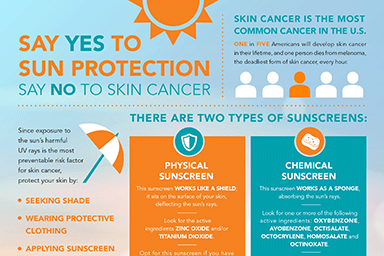The COVID-19 quarantine and social distancing mandates have dampened most summer plans here in the US. Meanwhile, many countries around the globe have managed the virus spread; countries are slowly re-opening and allowing for small gatherings to resume. Whether enjoying a quick stroll, a trip to restock your food supply, or if you’re one of lucky ones around the globe taking a mini beach vacation, or simply enjoying the outdoors, don’t forget your sun protection.
Sun damage can result in skin cancer – which may be terminal. Melanin deficient skin is more susceptible to damage from the sun’s UV rays, thus a sunscreen/sunblock is essential in preventing long-term skin issues. Sunscreens with an SPF of at least 30 block 97% of the sun’s UVB rays -while higher-number SPFs block slightly more of the sun’s UVB rays. The American Academy of Dermatology recommends everyone use sunscreen that offers the following: SPF 30+, protection against UVA & UVB damage, and is water resistant.
It may be difficult to know which products work best for your skin, and no matter the brand-name, quality is paramount; safety of ingredients as well as sustainability in packaging should be key considerations. No-Ad Sport Continuous Spray Sunblock and 3rd Rock sunblocks rate very desirably on the Environmental Working Group’s (EWG) ingredient safety score. Natural sunscreen brands that also rate low on the EWG skin-deep health warning score include: Badger, Celtic Complexion. Sun Deference, Adorable baby, Kabana organic Skincare among many others.
The main difference between sunscreen and sunblock lies in how they protect the skin against harmful UV rays. Sunblock simply blocks UV rays by forming a physical shield, while a sunscreen is a chemical composition that absorbs the UVA rays to prevent skin damage. Health professionals advise everyone to use sunscreen with an SPF of at least 30. Although dark-skinned people don’t get sunburned as quickly, they will still burn and are still susceptible to sun-induced damage—such as sun spots and wrinkles—and cancer. Historically, most companies did not create sun protection products catering to melanated skin. However, a recent wave of consumer products specially designed and marketed for melanated folks has grained traction, especially by black-owned business -and it is much needed.
Sun protection should be a year-round practice, even during winter. Whether you’re out enjoying nature for a few minutes, or hours, sunscreen with UV protection is key. As always, avoid cosmetics with toxic/harmful chemicals and dyes. Natural is best whenever possible; if needed, limit your exposure to avoid chronic health concerns. As you enjoy the summer sun, remember to stay safe and healthy, and mind your skin too.
